 Petzlover
Petzlover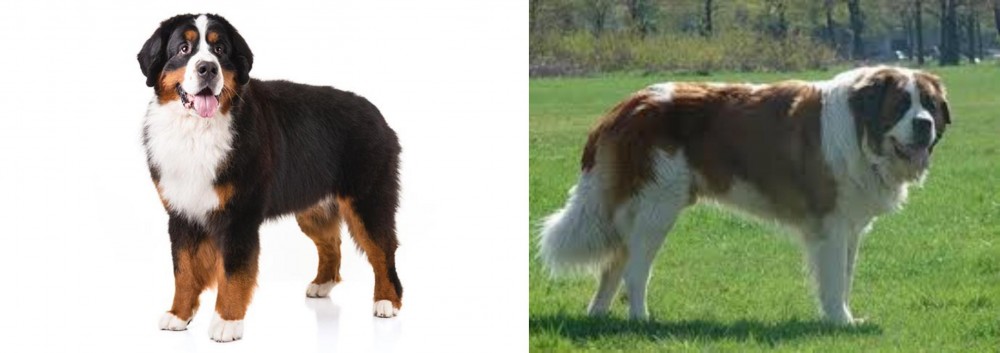 Bernese Mountain Dog is originated from Switzerland but Moscow Watchdog is originated from Russia. Both Bernese Mountain Dog and Moscow Watchdog are having almost same height. Bernese Mountain Dog may weigh 13 kg / 28 pounds lesser than Moscow Watchdog. Bernese Mountain Dog may live 3 years less than Moscow Watchdog. Bernese Mountain Dog may have more litter size than Moscow Watchdog. Both Bernese Mountain Dog and Moscow Watchdog requires Moderate Maintenance.
Bernese Mountain Dog is originated from Switzerland but Moscow Watchdog is originated from Russia. Both Bernese Mountain Dog and Moscow Watchdog are having almost same height. Bernese Mountain Dog may weigh 13 kg / 28 pounds lesser than Moscow Watchdog. Bernese Mountain Dog may live 3 years less than Moscow Watchdog. Bernese Mountain Dog may have more litter size than Moscow Watchdog. Both Bernese Mountain Dog and Moscow Watchdog requires Moderate Maintenance.
 The Bernese Mountain Dog comes from the Swiss Alps and is one of four separate breeds called Sennenhund or “Alpine pasture dog”. The Name Bernese Mountain Dog indicates the area of Switzerland that the dogs come from – the canton of Bern. These groups of dogs accompanied the dairymen and herders and they were farm dogs. They pulled carts, delivered goods from village to village. The Bernese Mountain Dog was part of this group along with: Greater Swiss Mountain Dog, Appenzeller,Entlebucher Mountain Dog and the Bernese Mountain Dog. It is probably true that the Bernese Mountain Dog has been a part of farm life in the Alps for over 2000 years.
The Bernese Mountain Dog comes from the Swiss Alps and is one of four separate breeds called Sennenhund or “Alpine pasture dog”. The Name Bernese Mountain Dog indicates the area of Switzerland that the dogs come from – the canton of Bern. These groups of dogs accompanied the dairymen and herders and they were farm dogs. They pulled carts, delivered goods from village to village. The Bernese Mountain Dog was part of this group along with: Greater Swiss Mountain Dog, Appenzeller,Entlebucher Mountain Dog and the Bernese Mountain Dog. It is probably true that the Bernese Mountain Dog has been a part of farm life in the Alps for over 2000 years.
In some regions of the Alps, these dogs were called Durrbachhund after a small town named Durrbah and are said to be rooted in the Molosser breeds. Tin 1902 the Swiss Kennel Club recognized the Bernese Mountain Dog as a separate breed and the first breed club was founded in 1907 in the region of Burgdorf. The first standard for the breed was written and separated the 4 dogs into their own breeds. The Molosser is an ancient breed whose versatility and travels made it expressly influential in the developing of Mastiff dogs like St. Bernards, Great Pyranees, Mastiffs and Swiss Mountain Dogs like the Bernese.
However at the end of the 19th century famers and shepherds began to import other breeds of working dogs, while at the same time automated modes of transportation began to replace the farm dogs. Under these circumstances the number of Bernese Mountain Dog began to decline and the breed faced potential extinction. A group of people were gathered together to save the Berner, including Franz Schertenleib and Albert Heim. Still today the Bernese are in short supply and because of the need and desire to increase the numbers, some breeding practices have not been as good as they should have been. However, today’s Berner is a great family dog and he still loves to work. He is good at carting, herding, search and rescue, watch dog, tracking, and competitive obedience.
The Bernese Mountain Dog came to the US after World War I and was imported to Britain in the 1930’s. The AKC accepted the Berner as a new Working-Class breed in 1937. It was not until 1968 that the Bernese Mountain Dog Club of America was formed. In 1981, the AKC accepted the club as a member and in 1990 they (AKC) adopted the standard used today to judge the Bernese Mountain Dog.
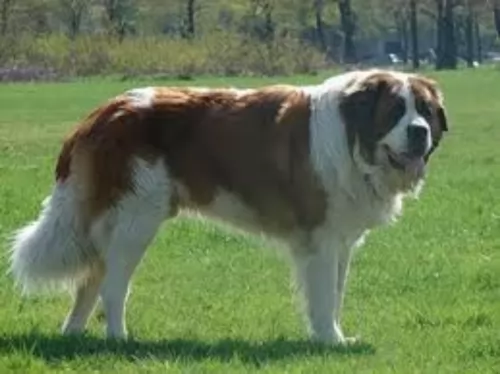 The Moscow Watchdog is a cross between the Caucasian Oytcharka, the St. Bernard and other Russian hound dogs. This large breed dog was developed in the Soviet Union for the purpose of being guard dogs. It had the awareness and assertiveness of the Oytcharka and the size, intelligence and attractiveness of the St. Bernard. The breed is common in Russia today but hardly seen anywhere else even though they were exported to the United States and Europe. The breed had the first U.S. born litter in 2015 and it is not AKC recognized.
The Moscow Watchdog is a cross between the Caucasian Oytcharka, the St. Bernard and other Russian hound dogs. This large breed dog was developed in the Soviet Union for the purpose of being guard dogs. It had the awareness and assertiveness of the Oytcharka and the size, intelligence and attractiveness of the St. Bernard. The breed is common in Russia today but hardly seen anywhere else even though they were exported to the United States and Europe. The breed had the first U.S. born litter in 2015 and it is not AKC recognized.
Following the second world war crime was on the rise in the Soviet Union and a new breed of dog was needed to counter this trend. The dog had to be adaptable to very cold temperatures, snowy weather and have a guard dog personality and ability. The breed was called on to guard such locations as railroads, government offices, warehouses, infrastructure and labor camps.
The project to develop this breed was led by General Medvedev beginning in 1946 at the Central School of Military Kynology – which was a department of the Soviet Ministry of Defense. It took many years to develop the Moscow Watchdog which then became a very successful breed.
It took until 1985 for the breed to be “officially” recognized in the Soviet Union and until 1992 to be recognized by the Federation of Dog Breeders in Russia and until 1997 for the standard to be approved by the Russian Kennel Club. They are still working with the FCI to gain international recognition for the breed. At the moment they are considered a part of the Molosser group and shown in the “Special Show” in Russia.
Committed breeders brought the Moscow Watchdog to Hungary in 1986 in order to make the breed more popular. In addition to this there were many breeders from previous Soviet States that wanted to preserve the breed as well. There were about 500 Moscow Watchdogs in Hungary around then. Currently there are about 27 Moscow Watchdogs in the United States. The breed is known to be a gentle giant and very much a family dog these days.
 The Bernese Mountain Dog is a large, lovable clown. He has a heavy build with a tri color- mostly black – coat. He should have a white chest and rust coloring on the front of his legs, the sides of his mouth, and above his eyes. His eyes should be dark and blue eyes are a disqualification. His coat is silky, thick and long. He has medium sized triangle shaped ears and a scissors bite. He has round toes and strong, straight legs, He is well suited to cold weather. His skull is broad and flat, his muzzle is straight and strong, his nose must be black, and he does not usually drool.
The Bernese Mountain Dog is a large, lovable clown. He has a heavy build with a tri color- mostly black – coat. He should have a white chest and rust coloring on the front of his legs, the sides of his mouth, and above his eyes. His eyes should be dark and blue eyes are a disqualification. His coat is silky, thick and long. He has medium sized triangle shaped ears and a scissors bite. He has round toes and strong, straight legs, He is well suited to cold weather. His skull is broad and flat, his muzzle is straight and strong, his nose must be black, and he does not usually drool.
He is an imposing sight, but he is also as non-aggressive as any breed. He is strong, intelligent, and agile. He should have his dew claws removed. This breed should be self-assured, yet good natured and calm. He is welcoming to strangers and loyal to his people. He needs his people.
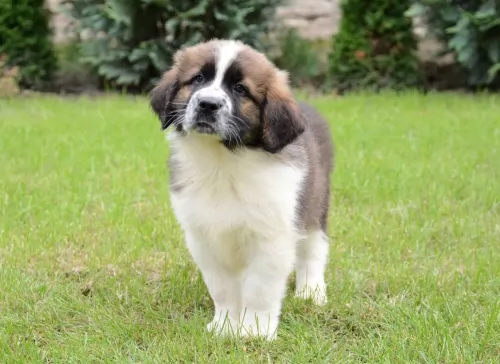 The Moscow Watchdog is related to the mountain dogs and is a very large breed. They are sturdy, muscular and powerful. They have big heads and a thick double coat that sheds profusely four times a year. They have a long tail, an arched chest and an air of confidence.
The Moscow Watchdog is related to the mountain dogs and is a very large breed. They are sturdy, muscular and powerful. They have big heads and a thick double coat that sheds profusely four times a year. They have a long tail, an arched chest and an air of confidence.
He is in the Mastiff family and is smart and trainable. He is not clumsy but has big bones. He is surprisingly agile and active for a dog his size. Unlike the St. Bernard he is not a couch potato. He is also differentiated from the St. Bernard because he does not drool.
These dogs are large but they’ve got a gentle temperament and are good with kids, being playful and energetic with them.
Even though he is a docile dog, you want him trained and socialized, and then he gets along well with other pets too. His sheer size makes it that it is best to supervise him when he’s around small children. He is also a protective dog breed, willing to bond closely to, and protect his human family.
 When reading the AKC standard for the Bernese Mountain Dog you will find that the breed is good natured and self-assured. They are not aggressive, shy or anxious. These are gentle, loving dogs. At the same time, they should be socialized to all kinds of animals, people and children when they are puppies. They are happy outside but need to live in the house with their people. They need exercise and play, and because they are so large, they need this outside. But when it comes to cuddling and sleeping they need to be indoors.
When reading the AKC standard for the Bernese Mountain Dog you will find that the breed is good natured and self-assured. They are not aggressive, shy or anxious. These are gentle, loving dogs. At the same time, they should be socialized to all kinds of animals, people and children when they are puppies. They are happy outside but need to live in the house with their people. They need exercise and play, and because they are so large, they need this outside. But when it comes to cuddling and sleeping they need to be indoors.
They love children though you should be careful with small children because of the Berner’s size and their not being aware of their size at times. They are extremely loyal to their people and want to be with people. They are intelligent, and they want to please their people. At the same time, they are sensitive. They do not respond well to punishment or harshness. They are imposing but they are lovers at heart.
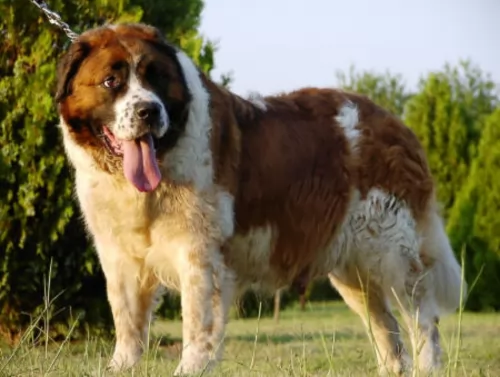 This is a large dog who likes to be involved and busy, even though he is so big. He isn’t suited to city life and being confined to a tiny garden as he needs space.
This is a large dog who likes to be involved and busy, even though he is so big. He isn’t suited to city life and being confined to a tiny garden as he needs space.
They’re independent dogs too and you can leave them alone during the day. He is social, so while you can leave them during the day while you’re at work, he’ll want your attention when you get back. They're such loving, loyal family pets that you owe it to him to make this gentle giant of a dog as happy as can be.
 Even though it is well known that cancer is the leading cause of dog deaths across the globe, the Bernese Mountain Dog is particularly prone to die of cancer. Half of all Berners compared with 27% of all dogs, die from cancer. The Berner’s life span is also shorter than most dogs his size. IT is also not just one cancer that attacks the Bernese Mountain Dog but rather at least 6 or more including mast cell, osteosarcoma, malignant histiocytosis, fibrosarcoma, and lymphosarcoma.
They can also suffer from PRA (Progressive Retinal Atrophy), hypoadrenocorticism, cataracts and histiocytic sarcoma. Another issue that plaques the Berner more than other breeds is musculoskeletal issues that cause mortality. This can include issues such as cruciate ligament rupture, arthritis and hip dysplasia. These types of aliments cause death in 6% of the breed while they are usually the cause of mortality in only 2% of all other dogs.
Even though it is well known that cancer is the leading cause of dog deaths across the globe, the Bernese Mountain Dog is particularly prone to die of cancer. Half of all Berners compared with 27% of all dogs, die from cancer. The Berner’s life span is also shorter than most dogs his size. IT is also not just one cancer that attacks the Bernese Mountain Dog but rather at least 6 or more including mast cell, osteosarcoma, malignant histiocytosis, fibrosarcoma, and lymphosarcoma.
They can also suffer from PRA (Progressive Retinal Atrophy), hypoadrenocorticism, cataracts and histiocytic sarcoma. Another issue that plaques the Berner more than other breeds is musculoskeletal issues that cause mortality. This can include issues such as cruciate ligament rupture, arthritis and hip dysplasia. These types of aliments cause death in 6% of the breed while they are usually the cause of mortality in only 2% of all other dogs.
 Moscow Watchdog is looked upon as a fairly healthy dog breed but there are some risks such as hip dysplasia as well as some other large breed problems.
Moscow Watchdog is looked upon as a fairly healthy dog breed but there are some risks such as hip dysplasia as well as some other large breed problems.
With big dogs like this, hip dysplasia is a threat. Its an hereditary condition where the parent dogs pass down the problematic genes. Hip dysplasia results in inflammation and pain for your pet, and where once he loved to play, he is reluctant to and battles to get up after lying down.
 As with any large purebred dog, the Bernese Mountain Dog needs high quality food that will provide hi with nutrition and keep him from becoming overweight if fed properly. He is however a very large dog with a very large appetite. Watch his calorie intake. It’s ok to use treats if you fit them into the overall calorie intake for the day. Feed him smaller meals twice a day.
As with any large purebred dog, the Bernese Mountain Dog needs high quality food that will provide hi with nutrition and keep him from becoming overweight if fed properly. He is however a very large dog with a very large appetite. Watch his calorie intake. It’s ok to use treats if you fit them into the overall calorie intake for the day. Feed him smaller meals twice a day.
As previously mentioned the breed has quite a few health challenges to deal with, cancer being the number one issue. The small genetic line is one of, if not the main, culprit in this high mortality rate and short life span of the Bernese Mountain Dog. In addition to the conditions mentioned above, they are also susceptible to bloat (stomach inversion). In addition, they face the conditions mentioned previously and should be tested for dysplasia of the hip and elbow, Von Willebrand’s Disease, Cardiac testing and an eye or ophthalmologist exam.
The Bernese Mountain Dog is a gentle giant. They have a calm happy demeanor and they love to work. In fact, they need to work. They love children and will quickly give them cart rides. They compete in carting competitions and herding events sponsored by the AKC. They need exercise but not an extreme amount or intense type. A half-hour a day is enough for them. They love long walks or hiking. They are great companions for backpacking or camping. They are also good at tracking, rally, obedience, and agility.
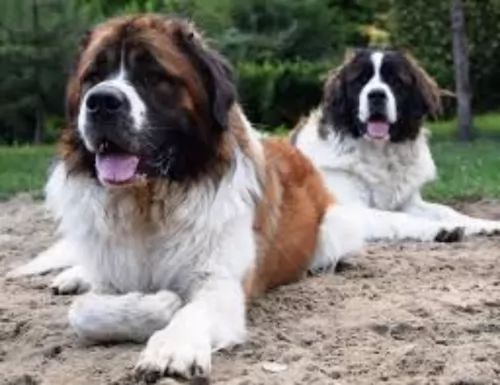 The Moscow Watchdog is a giant sized dog and will require a lot of regular exercise, and apart from a fairly brisk daily walk, will also need games and a run in the park.
The Moscow Watchdog is a giant sized dog and will require a lot of regular exercise, and apart from a fairly brisk daily walk, will also need games and a run in the park.
As a large dog requiring a regular dose of physical exercise as well as mental stimulation, he is better suited to life in the country or at least where there is a large garden.
The Moscow Watchdog has a medium length coat, and as a moderate shedder, you will need to simply brush his coat twice a week to remove loose hair. There is no professional grooming required for these dogs.
Homemade food is always a treat for a dog, but if you’re feeding your Moscow Watchdog commercially manufactured food because of the sheer convenience it provides, make sure the packaging says 'large- or giant dog breed' food. This way you know your pet is getting the right amount of minerals and vitamins for his size.
Always buy the best quality food to avoid giving your pet an overdose of colorants and preservatives. Try and give your pet some home-made food such as boiled chicken, some brown rice or pasta and some cooked vegetables such as sweet potatoes, carrots and spinach. These can be added to his kibble every now and again.
A simple diet like this agrees with your pet and he will be healthy and happy with his lot.